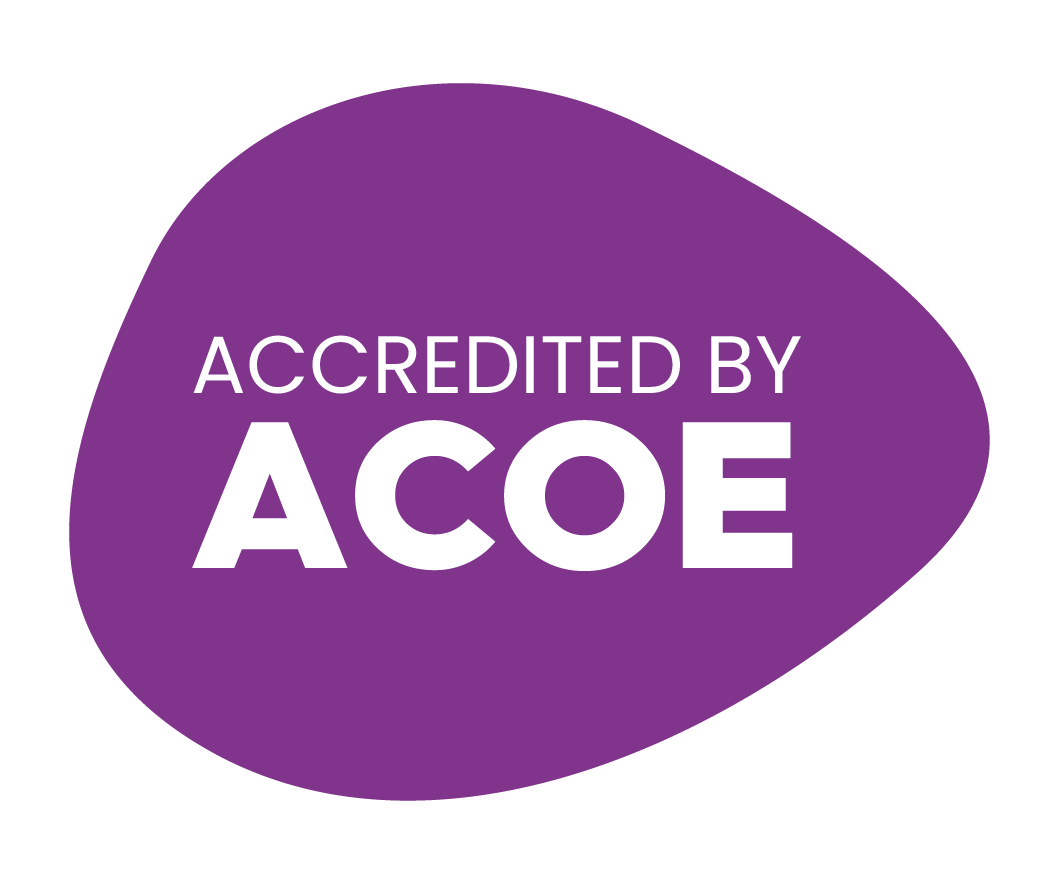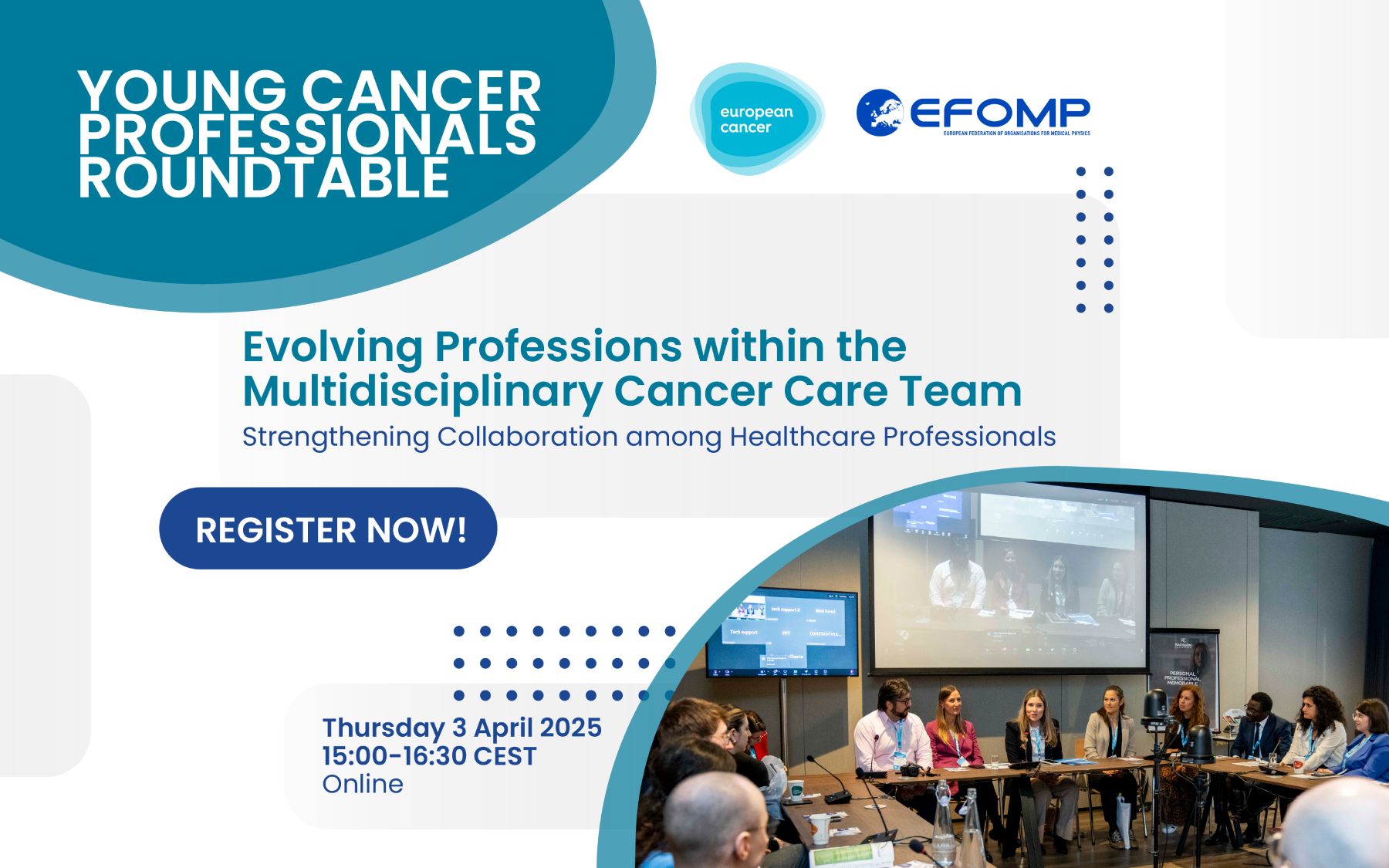A multidisciplinary approach was essential at every stage of the patient pathway. From diagnosis to treatment, technicians, nurses, and doctors worked together to save the lives of cancer patients.
Early career medical physicists from EFOMP showcased their often under-appreciated role in cancer care and highlighted the cooperation required from a variety of professionals, including administrators, physicists, psychologists, laboratory technicians, and others. National standards and requirements also influenced how physicists interacted with other healthcare professionals and patients.
This roundtable event sparked conversations about the challenges and benefits of multidisciplinary care and the development of young professionals.
The 'Evolving Professions within the Multidisciplinary Cancer Care Team' Roundtable was accredited by ACOE! By attending, participants were eligible to receive CME credits, advancing their professional development while gaining valuable knowledge.
Attendees also stayed for the Q&A session at the end - a chance to engage with top experts, ask questions, and share insights.

*Please note that the Continuing Medical Education (CME) credits from the roundtable could only be claimed by fully qualified medical specialist doctors.
Speakers
-
Nikolina Dodlek ECO Board Member and Young Cancer Professionals Steering Committee Member
-
Nefeli Tzoumi EFOMP Early Career for Medical Physicists SIG Steering Committee Member and Medical Physicist, Greek Atomic Energy Commission (EEAE)
-
Leticia Irazola Rosales Chair, EFOMP Early Career Special Interest Group and Medical Physicist, Fundacion Rioja Salud
-
Virginia Piva EFOMP Communications and Publications Committee Member; Medical Physics Resident, UNIMI - Niguarda Hospital & Research Fellow in Particle Therapy, INFN
-
Elisabeth Andritsch Head Clinical Psychologist and Psychotherapist, Psychooncologist, Medical University of Graz Division of Clinical Oncology
-
Amil Družić Oncology and Radiotherapy Resident, Clinical Center University of Sarajevo and Vice-Chair of HPV and Hep B Action Network
Speakers
-
Nikolina Dodlek ECO Board Member and Young Cancer Professionals Steering Committee Member
-
Nefeli Tzoumi EFOMP Early Career for Medical Physicists SIG Steering Committee Member and Medical Physicist, Greek Atomic Energy Commission (EEAE)
-
Leticia Irazola Rosales Chair, EFOMP Early Career Special Interest Group and Medical Physicist, Fundacion Rioja Salud
-
Virginia Piva EFOMP Communications and Publications Committee Member; Medical Physics Resident, UNIMI - Niguarda Hospital & Research Fellow in Particle Therapy, INFN
-
Elisabeth Andritsch Head Clinical Psychologist and Psychotherapist, Psychooncologist, Medical University of Graz Division of Clinical Oncology
-
Amil Družić Oncology and Radiotherapy Resident, Clinical Center University of Sarajevo and Vice-Chair of HPV and Hep B Action Network
-
-
Nefeli Tzoumi EFOMP Early Career for Medical Physicists SIG Steering Committee Member and Medical Physicist, Greek Atomic Energy Commission (EEAE)
-
Leticia Irazola Rosales Chair, EFOMP Early Career Special Interest Group and Medical Physicist, Fundacion Rioja Salud
-
Virginia Piva EFOMP Communications and Publications Committee Member; Medical Physics Resident, UNIMI - Niguarda Hospital & Research Fellow in Particle Therapy, INFN
-
Elisabeth Andritsch Head Clinical Psychologist and Psychotherapist, Psychooncologist, Medical University of Graz Division of Clinical Oncology
-
Amil Družić Oncology and Radiotherapy Resident, Clinical Center University of Sarajevo and Vice-Chair of HPV and Hep B Action Network Read Bio
-
Niall Brindl Surgery Resident, Heidelberg University Hospital and Junior Expert for INTERACT-EUROPE 100 Read Bio
Speakers
-
Nikolina Dodlek ECO Board Member and Young Cancer Professionals Steering Committee Member
-
Nefeli Tzoumi EFOMP Early Career for Medical Physicists SIG Steering Committee Member and Medical Physicist, Greek Atomic Energy Commission (EEAE)
-
Leticia Irazola Rosales Chair, EFOMP Early Career Special Interest Group and Medical Physicist, Fundacion Rioja Salud
-
Virginia Piva EFOMP Communications and Publications Committee Member; Medical Physics Resident, UNIMI - Niguarda Hospital & Research Fellow in Particle Therapy, INFN
-
Elisabeth Andritsch Head Clinical Psychologist and Psychotherapist, Psychooncologist, Medical University of Graz Division of Clinical Oncology
-
Amil Družić Oncology and Radiotherapy Resident, Clinical Center University of Sarajevo and Vice-Chair of HPV and Hep B Action Network
Programme
15:00-15:05 |
Welcome and introductions by Roundtable Co-Chairs |
|
|
15:05-15:20 |
Setting the Scene: The Current Landscape of Multidisciplinary Cancer Care in Europe |
|
|
15:20-15:35 |
Young Cancer Professionals perspective: challenges, scope and benefits of multidisciplinary collaboration |
|
|
15:35-15:45 |
Effective Communication in Multidisciplinary Teams: The Role of Communication Specialists |
|
|
15:45-15:55 |
Communication within a Multidisciplinary Team: Insights from INTERACT-EUROPE 100 - The Communication Module |
|
|
15:55-16:25 |
Discussion and Q&A |
16:25-16:30 |
Closing remarks by Co-Chairs |
Speakers
-
Nikolina Dodlek ECO Board Member and Young Cancer Professionals Steering Committee Member
-
Nefeli Tzoumi EFOMP Early Career for Medical Physicists SIG Steering Committee Member and Medical Physicist, Greek Atomic Energy Commission (EEAE)
-
Leticia Irazola Rosales Chair, EFOMP Early Career Special Interest Group and Medical Physicist, Fundacion Rioja Salud
-
Virginia Piva EFOMP Communications and Publications Committee Member; Medical Physics Resident, UNIMI - Niguarda Hospital & Research Fellow in Particle Therapy, INFN
-
Elisabeth Andritsch Head Clinical Psychologist and Psychotherapist, Psychooncologist, Medical University of Graz Division of Clinical Oncology
-
Amil Družić Oncology and Radiotherapy Resident, Clinical Center University of Sarajevo and Vice-Chair of HPV and Hep B Action Network
Speakers
-
Nikolina Dodlek ECO Board Member and Young Cancer Professionals Steering Committee Member
-
Nefeli Tzoumi EFOMP Early Career for Medical Physicists SIG Steering Committee Member and Medical Physicist, Greek Atomic Energy Commission (EEAE)
-
Leticia Irazola Rosales Chair, EFOMP Early Career Special Interest Group and Medical Physicist, Fundacion Rioja Salud
-
Virginia Piva EFOMP Communications and Publications Committee Member; Medical Physics Resident, UNIMI - Niguarda Hospital & Research Fellow in Particle Therapy, INFN
-
Elisabeth Andritsch Head Clinical Psychologist and Psychotherapist, Psychooncologist, Medical University of Graz Division of Clinical Oncology
-
Amil Družić Oncology and Radiotherapy Resident, Clinical Center University of Sarajevo and Vice-Chair of HPV and Hep B Action Network

